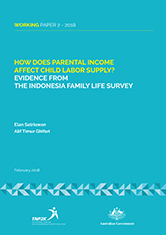How Does Parental Income Affect Child Labor Supply: Evidence From The Indonesia Family Life Survey
Drawing on the substitution axiom formulated by Basu and Van (1998) this study examines the nature of relationship between parental income and child labor supply in Indonesia.
To estimate such relationship, we are benefited by panel data from the last two waves of Indonesia Family Life Survey (2007 and 2014). We tackle the potential endogeneity in parental income by controlling for parental fixed-effect.
Results shows that parental income matter to child labor supply. The effect of father’s income looks more significant to all sample particularly to girls. In rural areas, both parental income matter to girls, and not to boys. The relationship between a father’s income (and mother’s in rural) with children’s labor hours are complementary at low level of income, and as income rises, the increments in child labor hours decreases and at high levels of income, the relationship transforms into a substitute relationship –resembling an inverted-U shape.
✭ ✯ ✰ ✱ ✲ ✳ ❃ ❂ ❁
